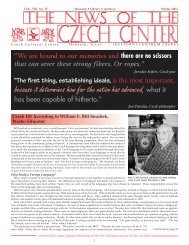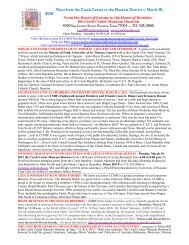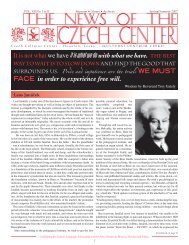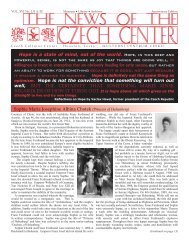If you lived as I did, several years under Nazi totalitarianism, and ...
If you lived as I did, several years under Nazi totalitarianism, and ...
If you lived as I did, several years under Nazi totalitarianism, and ...
You also want an ePaper? Increase the reach of your titles
YUMPU automatically turns print PDFs into web optimized ePapers that Google loves.
Schengen (continued) The Nauenberg Story<br />
they were charged <strong>and</strong> their friends arrested.<br />
Of course the whole charade took place a safe<br />
distance inside the border.<br />
After 1953, a two-<strong>and</strong>-half meter fence w<strong>as</strong><br />
put up around the border <strong>and</strong> charged with high<br />
voltage, the so-called wall of death. The fence<br />
w<strong>as</strong> the idea of Ludvik Hlavacka, a State<br />
Security officer. He w<strong>as</strong> reputed to have been<br />
a Gestapo confidant. In the 1950s he w<strong>as</strong> an<br />
investigator for the State Security in Uherske<br />
Hradiste, where he constructed an electric torture<br />
device. After studying in the USSR he w<strong>as</strong><br />
made the head of the border guard, <strong>and</strong> finally<br />
Deputy Minister of the Interior. According<br />
to historians Hlavacka w<strong>as</strong> one of the people<br />
who were directly responsible for the deadly<br />
installations on the border. The border guards<br />
Hlavacka comm<strong>and</strong>ed, who ch<strong>as</strong>ed <strong>and</strong> shot<br />
people, were presented by communist propag<strong>and</strong>a<br />
<strong>as</strong> heroes, tough men protecting the<br />
“people’s democratic” system. When I w<strong>as</strong> six<br />
or seven <strong>years</strong> old I met some border guards at<br />
Pioneer camp. They demonstrated the training<br />
of a “self-motivated attack dog” that w<strong>as</strong> able<br />
to bring down the “violator.” In the Border<br />
Guard Museum there w<strong>as</strong> a preserved mounted<br />
dog named Brek, who had personally <strong>as</strong>sisted<br />
in the apprehension of some 50 “violators,” <strong>and</strong><br />
w<strong>as</strong> accordingly decorated by the state.<br />
People succeeded in crossing the border by<br />
various means throughout the entire era of<br />
communist rule. In 1951 an engineer hijacked<br />
a train to Germany with more than a hundred<br />
people on it; thirty-four of them remained in the<br />
West. In 1961, a home-adapted truck sm<strong>as</strong>hed<br />
through the barriers with seven people on<br />
board. In 1966, two people galloped away from<br />
a police patrol on horseback. During the “normalization”<br />
era of the 1970s <strong>and</strong> 1980s, people<br />
tried to flee by hiding in the trunks of western<br />
tourists’ automobiles or, in one c<strong>as</strong>e, got away<br />
in a small tank pieced together in a barn. One<br />
of my friends from France helped get a persecuted<br />
Czech musician out – he resembled her<br />
French friend, so she got him though on her<br />
friend’s French p<strong>as</strong>sport. To close this article,<br />
allow me to say something personal. Sometime<br />
in 1988, my friend Svatopluk <strong>and</strong> I thought of<br />
a plan to get to the West. I w<strong>as</strong> sixteen, <strong>and</strong><br />
it w<strong>as</strong> a pretty adolescent idea: Svata had a<br />
cousin in Austria who regularly traveled to<br />
Prague. So he got the idea (archives show that<br />
he w<strong>as</strong> not alone) of hiding in his Audi, in the<br />
trunk or behind the back seat. He said no one<br />
ever checked his cousin – it w<strong>as</strong> a sure thing.<br />
Fortunately his cousin w<strong>as</strong> a sensible person<br />
<strong>and</strong> told Svata no way. But the plan impressed<br />
me, <strong>and</strong> remained firmly in my memory – <strong>and</strong><br />
certainly it contributed to the fact that whenever<br />
I crossed the border after 1989, I felt a slight<br />
tingling <strong>and</strong> a relieved, almost blessed feeling,<br />
when we got to the other side. A polite policeman<br />
is still a policeman; a formal border check<br />
is still a check. Now it’s all gone, <strong>and</strong> it seems I<br />
feel somewhat more normal than I <strong>did</strong> before.<br />
Adam Drda, Heart of Europe<br />
It w<strong>as</strong> the summer of 1976, <strong>and</strong> I w<strong>as</strong> sailing<br />
the Sc<strong>and</strong>inavian se<strong>as</strong> on the cruise ship Daphne<br />
when I happened to meet two charming women,<br />
a mother <strong>and</strong> her daughter, whom had a dramatic<br />
Holocaust story to tell. The mother w<strong>as</strong> Erna<br />
Sachs Nauenberg. The daughter is Lucrecia<br />
Nauenberg El Abd. Instead of recounting my<br />
story, I will have Erna tell it: “My husb<strong>and</strong> w<strong>as</strong><br />
Walter Gerhard Nauenberg, born January 29,<br />
1897. I w<strong>as</strong> born September 26, 1903. We <strong>lived</strong><br />
<strong>and</strong> were educated in Berlin. We were trained<br />
<strong>as</strong> medical doctors <strong>and</strong> worked at the Berlin<br />
hospital. Three children were born to us: Eva<br />
in 1933, Michael in 1934, <strong>and</strong> Uriel in 1938.<br />
In 1938, my mother, Emma Kalmann, w<strong>as</strong> the<br />
only surviving member of her generation in<br />
our family.<br />
My husb<strong>and</strong> <strong>and</strong> I served <strong>as</strong> physicians to <strong>several</strong><br />
consulates in Berlin. By re<strong>as</strong>on of special<br />
medical service we rendered, we formed a particularly<br />
close friendship with the Amb<strong>as</strong>sador<br />
of the Republic of Columbia. When a visitor to<br />
a consulate in Berlin needed medical attention,<br />
we were called.<br />
With the rise of Hitler <strong>and</strong> <strong>Nazi</strong>sm in 1933,<br />
we realized that we had to flee Germany, but<br />
Emma w<strong>as</strong> too frightened to leave. Because of<br />
Emma’s reluctance, we found ourselves with<br />
three small children <strong>under</strong> the age of five still<br />
in Berlin in late 1938.<br />
It w<strong>as</strong> on Kristallnacht (the Night of Broken<br />
Gl<strong>as</strong>s) November 9, 1938, when the Gestapo<br />
came to our home banging on the front door,<br />
hunting my husb<strong>and</strong>. It w<strong>as</strong> a terrible night. The<br />
<strong>Nazi</strong>s systematically looted homes <strong>and</strong> stores,<br />
set fire to synagogues <strong>and</strong> instigated m<strong>as</strong>s<br />
rioting all across Germany. The Amb<strong>as</strong>sador<br />
of Columbia, aware of the gravity of situation,<br />
came to the back door of our home on<br />
Neuewinterfeldstr<strong>as</strong>se to warn my husb<strong>and</strong> <strong>and</strong><br />
offer <strong>as</strong>ylum. With the Gestapo outside of our<br />
front door, the Amb<strong>as</strong>sador helped my husb<strong>and</strong><br />
escape through the back door <strong>and</strong> took him<br />
directly to the Columbian Emb<strong>as</strong>sy. After the<br />
rioting had died down somewhat, my husb<strong>and</strong><br />
called me from the emb<strong>as</strong>sy <strong>and</strong> told me to<br />
leave everything <strong>and</strong> come there with the children<br />
immediately. I w<strong>as</strong> eight months pregnant.<br />
The Gestapo <strong>did</strong> not take the children <strong>and</strong> me<br />
on Kristallnacht because the leader of the group<br />
said he <strong>did</strong> not want to deal with the mess of a<br />
woman giving birth in Gestapo headquarters,<br />
but he stated they would come back for us the<br />
next day.<br />
After that dreadful night, my husb<strong>and</strong> never<br />
returned to our home in Berlin. It w<strong>as</strong> a fine<br />
home, furnished with fine antiques including<br />
a beautiful Bosendorfer gr<strong>and</strong> piano my<br />
husb<strong>and</strong> loved to play. I left everything. The<br />
Columbian Amb<strong>as</strong>sador granted my husb<strong>and</strong><br />
a visa <strong>and</strong> arranged for him to be spirited<br />
across the German border into Holl<strong>and</strong> where<br />
he boarded a ship for Columbia. He made one<br />
l<strong>as</strong>t telephone call to us from Holl<strong>and</strong> before<br />
leaving Europe; upon being told of the birth of<br />
Uriel on December 16, Beethoven’s birthday,<br />
T h e N e w s o f T h e C z e c h C e n t e r<br />
19<br />
he pleaded with me to name him “Ludwig”<br />
in honor of the great composer. However, in<br />
1938, the Third Reich had issued a decree that<br />
all Jewish women were required to choose the<br />
names of their newborns from a governmentm<strong>and</strong>ated<br />
list. At the time of our son’s birth,<br />
the name on the list that w<strong>as</strong> the le<strong>as</strong>t offensive<br />
to me w<strong>as</strong> Uriel. I always wanted to give my<br />
male children names of archangels. My first<br />
son w<strong>as</strong> named Michael, the name of my father<br />
<strong>as</strong> well <strong>as</strong> the one of the archangels. Uriel w<strong>as</strong><br />
nicknamed “Uli.”<br />
After “Uli” w<strong>as</strong> born, the Columbian<br />
Amb<strong>as</strong>sador arranged vis<strong>as</strong> to Columbia for our<br />
children <strong>and</strong> me, <strong>as</strong> well <strong>as</strong> our nanny because<br />
I w<strong>as</strong> by then the official physician of the<br />
Emb<strong>as</strong>sy. As we prepared to leave Germany,<br />
the Gestapo came to our home everyday to<br />
inspect items we proposed to take with us from<br />
Germany. The one professional memento they<br />
allowed me to take w<strong>as</strong> the microscope I used<br />
in my medical office in Berlin. My three children<br />
<strong>and</strong> I, with our nanny, boarded a boat in<br />
Hamburg bound for Barranquilla, Columbia<br />
(one of the few places in South America that<br />
would accept refugees fleeing <strong>Nazi</strong> Germany).<br />
We arrived there on June 6, 1939. What of my<br />
mother, Emma Kalmann? She w<strong>as</strong> unable to<br />
overcome her fear of leaving Germany, <strong>and</strong><br />
despite all efforts to persuade her, she remained<br />
there. For many <strong>years</strong> we were unable to learn<br />
her fate but eventually learned that she perished<br />
at Theresienstadt Concentration Camp in 1943.<br />
Some of the leading politicians in Columbia<br />
were xenophobic about the sudden influx of<br />
educated Europeans <strong>and</strong> made life difficult<br />
for us. My husb<strong>and</strong> <strong>and</strong> I were forced to take<br />
repeated medical examinations in Bogota before<br />
we were allowed to practice. We were without<br />
money, <strong>and</strong> trips to Bogota for the exams were<br />
very costly. In Berlin, in the early 1930s, a<br />
<strong>you</strong>ng Columbian girl whom w<strong>as</strong> a guest of the<br />
Amb<strong>as</strong>sador became deathly ill; my husb<strong>and</strong><br />
<strong>and</strong> I were called to provide medical care for<br />
her. The girl <strong>lived</strong>. When the girl’s mother<br />
learned that we were in Columbia <strong>and</strong> we were<br />
the physicians who saved her daughter’s life,<br />
we became guests in her home when we were<br />
in Bogota, thus creating a life long friendship.<br />
The girl’s mother w<strong>as</strong> named Lucrecia, <strong>and</strong><br />
when our daughter w<strong>as</strong> born in 1947, we named<br />
her Lucrecia to honor the Columbian woman’s<br />
unbounded kindness.”<br />
The Nauenburg family emigrated to the l<strong>and</strong><br />
of the free <strong>and</strong> the home of the brave in 1954.<br />
Walter Gerhard Nauenberg died June 15, 1987.<br />
Erna Sachs Nauenberg died April 13, 1990. I<br />
am deeply indebt to my very special friend,<br />
Lucrecia El Abd, for refreshing my recollection<br />
of this intriguing <strong>and</strong> enchanting story.<br />
Charles Sa<strong>under</strong>s – The Campus Cub<br />
Youth is happy because it h<strong>as</strong> the ability to<br />
see beauty. Anyone who keeps the ability to see<br />
beauty never grows old.<br />
Franz Kafka 1883 - 1924









